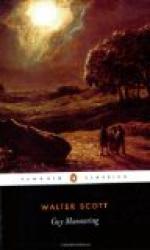These things did not pass without notice and censure. We are not made of wood or stone, and the things which connect themselves with our hearts and habits cannot, like bark or lichen, be rent away without our missing them. The farmer’s dame lacked her usual share of intelligence, perhaps also the self-applause which she had felt while distributing the awmous (alms), in shape of a gowpen (handful) of oatmeal, to the mendicant who brought the news. The cottage felt inconvenience from interruption of the petty trade carried on by the itinerant dealers. The children lacked their supply of sugarplums and toys; the young women wanted pins, ribbons, combs, and ballads; and the old could no longer barter their eggs for salt, snuff, and tobacco. All these circumstances brought the busy Laird of Ellangowan into discredit, which was the more general on account of his former popularity. Even his lineage was brought up in judgment against him. They thought ’naething of what the like of Greenside, or Burnville, or Viewforth might do, that were strangers in the country; but Ellangowan! that had been a name amang them since the Mirk Monanday, and lang before—him to be grinding the puir at that rate! They ca’d his grandfather the Wicked Laird; but, though he was whiles fractious aneuch, when he got into roving company and had ta’en the drap drink, he would have scorned to gang on at this gate. Na, na, the muckle chumlay in the Auld Place reeked like a killogie in his time, and there were as mony puir folk riving at the banes in the court, and about the door, as there were gentles in the ha’. And the leddy, on ilka Christmas night as it came round, gae twelve siller pennies to ilka puir body about, in honour of the twelve apostles like. They were fond to ca’ it papistrie; but I think our great folk might take a lesson frae the papists whiles. They gie another sort o’ help to puir folk than just dinging down a saxpence in the brod on the Sabbath, and kilting, and scourging, and drumming them a’ the sax days o’ the week besides.’




